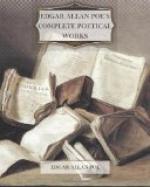“We see an instance of Coleridge’s liability to err, in his ’Biographia Literaria’—professedly his literary life and opinions, but, in fact, a treatise ‘de omni scibili et quibusdam aliis’. He goes wrong by reason of his very profundity, and of his error we have a natural type in the contemplation of a star. He who regards it directly and intensely sees, it is true, the star, but it is the star without a ray—while he who surveys it less inquisitively is conscious of all for which the star is useful to us below—its brilliancy and its beauty.
“As to Wordsworth, I have no faith in him. That he had in youth the feelings of a poet I believe—for there are glimpses of extreme delicacy in his writings—(and delicacy is the poet’s own kingdom—his ’El Dorado’)—but they have the appearance of a better day recollected; and glimpses, at best, are little evidence of present poetic fire; we know that a few straggling flowers spring up daily in the crevices of the glacier.
“He was to blame in wearing away his youth in contemplation with the end of poetizing in his manhood. With the increase of his judgment the light which should make it apparent has faded away. His judgment consequently is too correct. This may not be understood,—but the old Goths of Germany would have understood it, who used to debate matters of importance to their State twice, once when drunk, and once when sober—sober that they might not be deficient in formality—drunk lest they should be destitute of vigor.
“The long wordy discussions by which he tries to reason us into admiration of his poetry, speak very little in his favor: they are full of such assertions as this (I have opened one of his volumes at random)—’Of genius the only proof is the act of doing well what is worthy to be done, and what was never done before;’—indeed? then it follows that in doing what is ’un’worthy to be done, or what ‘has’ been done before, no genius can be evinced; yet the picking of pockets is an unworthy act, pockets have been picked time immemorial, and Barrington, the pick-pocket, in point of genius, would have thought hard of a comparison with William Wordsworth, the poet.
“Again, in estimating the merit of certain poems, whether they be Ossian’s or Macpherson’s can surely be of little consequence, yet, in order to prove their worthlessness, Mr. W. has expended many pages in the controversy. ‘Tantaene animis?’ Can great minds descend to such absurdity? But worse still: that he may bear down every argument in favor of these poems, he triumphantly drags forward a passage, in his abomination with which he expects the reader to sympathise. It is the beginning of the epic poem ‘Temora.’ ’The blue waves of Ullin roll in light; the green hills are covered with day; trees shake their dusty heads in the breeze.’ And this—this gorgeous, yet simple imagery, where all is alive and panting with immortality—this, William Wordsworth, the author of ‘Peter Bell,’ has ‘selected’ for his contempt. We shall see what better he, in his own person, has to offer. Imprimis:




